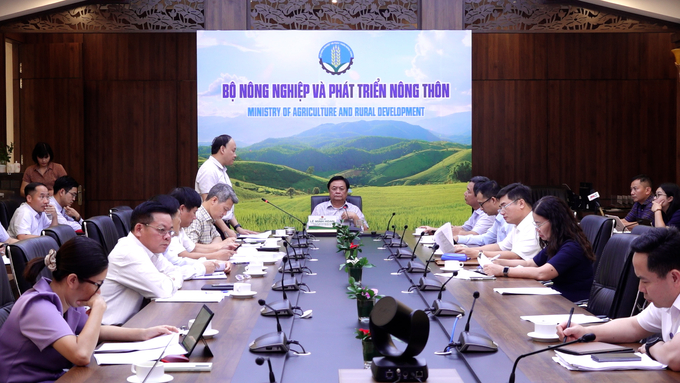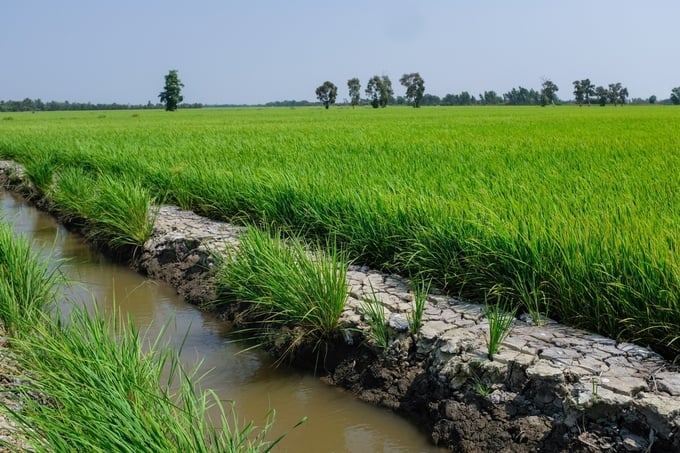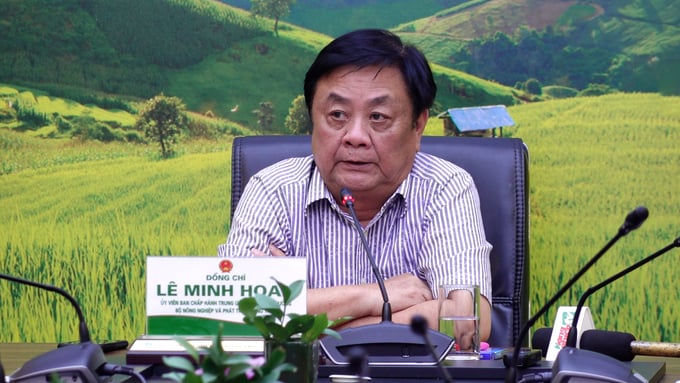June 18, 2025 | 02:48 GMT +7
June 18, 2025 | 02:48 GMT +7
Hotline: 0913.378.918
June 18, 2025 | 02:48 GMT +7
Hotline: 0913.378.918

Minister Le Minh Hoan chaired the meeting on prevention and control of drought, saltwater intrusion in the Mekong Delta and challenges in the coming time. Photo: Quang Dung.
According to Mr. Nguyen Tung Phong, the Director of the Department of Irrigation, the issue of saltwater intrusion over the period of 2023-2024 has been intricate. While the current obstacles may not be as severe as those experienced in previous periods, they have different traits.
The Department of Irrigation's study indicates significant advancements in the Mekong Delta's shift of output, seasons, and structures, as it increasingly adapts to different water sources. In the last ten years, fruit trees cultivation area has grown by 90,000 hectares, while the shrimp-rice farming methods have expanded by around 6,000 hectares. Bac Lieu and Kien Giang provinces are shifting from shrimp farming to rice-shrimp production.
In 2023-2024, drought and saltwater intrusion will present sooner than usual, both in terms of time and pace. This is resulting in water shortages that are escalating rapidly. Water shortage aligns with the need for agricultural irrigation.
This year, there is a 30% deficit in rainfall, and the extended heat is leading to significant rates of evaporation. As a result, the water levels in several reservoirs have decreased by around 15cm.
The Department of Irrigation predicts that there will be another period of high levels of saltwater intrusion from April 23 to 27. After May, the saltwater intrusion will gradually decrease and will no longer have an impact on water supplies for agricultural output starting from early June.
Saltwater intrusion in the Vam Co and coastal regions is steadily increasing, with the highest levels expected between May 6 and 10, and remaining elevated until the end of May 2024. Starting in June, saltwater intrusion will significantly diminish and cease to impact water supplies for agricultural output by the end of June.
The Cai Lon - Cai Be irrigation system will operate in the western coastal regions to manage saltwater intrusion and fulfill water requirements.

This year, the rainfall deficit is up to 30%, and the prolonged heat problem has caused the amount of water in some water storage works to evaporate to about 15cm high. Photo: Quynh Chi.
To address these challenges, the Department of Irrigation suggests several solutions. These include improving the monitoring of weather and hydrological conditions, providing ongoing forecasts and advisories to the public, increasing the operation of irrigation systems to optimize the collection and storage of freshwater, implementing measures to guarantee sufficient water supply for households, and intensifying the dissemination of information, guidance, and mobilization efforts to encourage the adoption of safe water harvesting, storage, and treatment practices, particularly in areas with limited water resources, and promoting the efficient use of water.
Nguyen Tung Phong stresses the need of proactive development in irrigation to address drought and saltwater intrusion. He highlights the fundamental idea of efficiently using water resources while following natural laws and adjusting to practical realities. He stresses the need of taking proactive measures and building "early action" plans to address drought and intrusion. In addition, he proposes the implementation of both physical and non-physical solutions, using technology to facilitate the organization of production and dissemination of information to the general public.
According to Mr. Nguyen Tung Phong, water plays a vital role in the Mekong Delta rice project, which spans over 1 million hectares, by helping to decrease emissions. Failure to complete irrigation systems, particularly internal drainage systems, may impede the ability to effectively manage irrigation water in accordance with emission reduction mandates. This work is also included in the objectives of irrigation to fulfill.
According to Ms. Nguyen Thi Thu Huong, the Deputy Director of the Crop Cultivation Department, there has been effective collaboration between the Irrigation Department and the Crop Cultivation Department in providing early warnings about planting seasons, water advisories, and prioritizing factors for water supply. As a result, the damage caused by saltwater intrusion has been significantly reduced compared to previous years.
In the future, the crop production sector will create plans for calculating cultivation scenarios, adjust crop structures, and provide suitable suggestions, depending on the saltwater intrusion scenarios provided by the Department of Irrigation.
Minister Le Minh Hoan emphasized that evaluating the present conditions of drought and saltwater intrusion provides valuable insights into broader strategic concerns. The Ministry of Agriculture and Rural Development is currently developing a comprehensive plan to address four major challenges in the Mekong Delta: drought, salinity, subsidence, and landslides. This plan is in accordance with the Prime Minister's directive and aims to achieve sustainable development in the Mekong Delta by adapting to climate change.
Furthermore, it is essential to arrange specialist workshops and seminars to specifically tackle intricate matters of fisheries, agriculture, and other related topics pertaining to saltwater intrusion. In order to effectively implement the comprehensive plan, it is essential to include investment strategies that encompass both infrastructure and non-infrastructure measures across all three tiers of disaster management, namely central, local authorities, and communities.

The Minister also suggested that from the experience of developed countries, adapting to saline intrusion can be an opportunity for new innovations, new technologies, and new products. Photo: Quang Dung.
The Minister proposed learning from the experiences of developed nations and highlighted that addressing saltwater intrusion could create opportunities for new innovations, technologies, and products to manage this issue. This could begin with small-scale technologies at the household level, potentially benefiting the aquaculture economy in the long run.
In addition, he emphasized the need of using a multi-sectoral and multidisciplinary methodology. The primary purpose of developing observation systems is to achieve many goals, by enabling the effective exploitation of data across several industries and disciplines.
The Minister emphasized that the issues faced by the Mekong Delta are not limited to saltwater intrusion alone. They also include the complex interaction of drought, salinity, and freshwater, both in terms of location and time. Investing in remote sensing technology is seen as a prudent investment for industrial groups grappling with the present circumstances in the Mekong Delta.
In addition, the MARD leadership highlighted the importance of international collaboration among countries in the Mekong Basin to manage competing national interests, utilize innovative technologies to tackle saltwater intrusion problems, and seek assistance and involvement from international organizations working on relevant issues in the Mekong Delta.
Translated by Dieu Linh

(VAN) The results of national programs are essential for establishing a contemporary livestock sector that is well-equipped to meet the demands of both domestic and international markets, with robust biosafety standards.

(VAN) The UNESCO Global Geopark revalidation of Non nuoc Cao Bang and the transition to a two-tier administrative model are presently undergoing a pivotal moment in Cao Bang, the northernmost province of Vietnam.
/2025/06/13/5330-2-004539_953.jpg)
(VAN) Changing policy mindset and removing investment barriers are urgent requirements to open up new development space for enterprises in the agricultural sector.

(VAN) The areas include the restoration of five million hectares of marine ecosystems.

(VAN) Dr. Le Van Nguyen, Director of the Institute of E-Commerce Management (ECM), emphasizes the potential for green development through the cultivation of fruit trees, particularly in provinces such as Son La.

(VAN) VAAS and numerous Vietnamese enterprises have signed cooperation agreements with Japanese partners to promote agricultural technology and trade connectivity.
/2025/05/29/5625-12-214801_567.jpg)
(VAN) Provincial mergers in the Mekong Delta promise to streamline administration, expand inter-provincial raw material areas, and foster close linkages in agricultural value chains, benefiting both businesses and cooperatives.